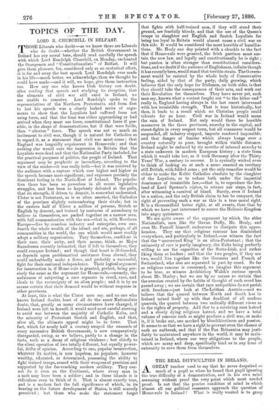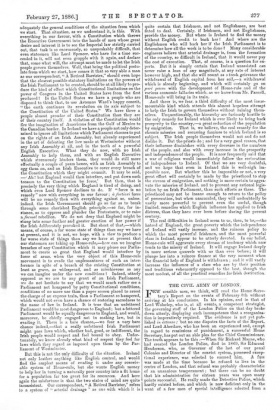THE REAL DIFFICULTIES IN IRELAND.
AGREAT teacher used to say that he never despaired so much of a pupil as when he found that pupil ignoring the true difficulty of a demonstration, and in his own mind assuming without proof the very point which most needed proof. Is not that the precise condition of mind in which almost all our political reasoners approach the question of Home-rule in Ireland ? What is really wanted is to grasp
adequately the general conditions of the situation from which we start. That situation, as we understand it, is this. With everything in our favour, with a Constitution which throws the Executive Government into the hands of men whose great desire and interest it is to see the Imperial law strictly carried out, that task is so enormously, so unspeakably difficult, that even statesmen like Lord Spencer, who have for a time suc- ceeded in it, will not even grapple with it again, and declare that, come what will, the attempt must be made to let the Irish people govern themselves. Well, that being the political postu- late from which we start, how comes it that so very able a man as our correspondent, "A Retired Barrister," should even hope that the clearest possible statutory limitations on the powers of the Irish Parliament to be created, should be at all likely to pro- duce the kind of effect which Constitutional limitations on the power of Congress in the United States have from the first produced ? In the United States we have a people who are disposed to think that, to use Artemus Ward's happy conceit, "the earth continues its revolution on its axis subject to the Constitution of the United States." We have there a people almost prouder of their Constitution than they are of their country itself. A violation of the Constitution would fire the imagination of Americans from the Gulf of Mexico to the Canadian border. In Ireland we have a people not only deter- mined to ignore all limitations which Parliament chooses to put on the rights of an Irish Assembly, but already experienced in the art of defeating the law made at Westminster without any Irish Assembly at all, and in the teeth of a powerful English Executive. What they do now, with no Irish Assembly to help them, and with an English Executive which strenuously hinders them, they would do still more effectually a couple of years hence, with an Irish Assembly to egg them on, and an Irish Executive to cover every breach of the Constitution which they might commit. It may be said,
Ah ! but England would then interfere, and put down such treason to the Constitution by force.' But then, that is precisely the very thing which England is tired of doing, and which even Lord Spencer declines to do. If "force is no remedy" now with everything in our favour ; a fortiori force will be no remedy then with everything against ue, unless, indeed, the Irish Government should go so far as to break through some cherished English principle,—so far, for in- stance, as to oppress and plunder the Protestants, or to raise a formal rebellion. We do not deny that England might be stung into some further and greater exertion of her power if the Irish deliberately provoked it. But short of that,—which means, of course, a far worse state of things than any we have at present, and it is not, we hope, with a view to produce a far worse state of things than any we have at present that our statesmen are taking up Home-rule,—how can we imagine breaches of any Constitution which it may please our Parlia- ment to create so great that England would interfere by force of arms, when the very object of this Home-rule movement is to evade the unpleasantness of such an inter- ference in spite of a breach of the existing Constitution at least as grave, as widespread, and as mischievous as any we can imagine under the new conditions ? Indeed, utterly opposed as we are to any grant of an Irish Parliament, we do not hesitate to say that we would much rather see a Parliament not hampered by petty Constitutional conditions, conditions of no more use than a paper screen placed to arrest the charge of an express train, than a Parliament so hampered, which would not even have a chance of restoring sacredness to
the name of law in Ireland. It is true that an unfettered Parliament would be most dangerous to England; but a fettered Parliament would be equally dangerous to England, and would, moreover, be chiefly engaged not in making law, but in evading it. There is a bare chance,—we fear a very bare chance indeed,—that a really unfettered Irish Parliament might pass laws which, whether bad, good, or indifferent, the Irish people would respect and feel bound to obey. Unfor- tunately, we know already what kind of respect they feel for laws which they regard as imposed upon them by the Par- liament of Westminster.
But this is not the only difficulty of the situation. Ireland not only loathes anything like English control, and would
find the amplest means of evading it under any conceiv- able system of Home-rule, but she wants English money to help her in turning a naturally poor country into a fit home for a population far too great for its resources. And here again the misfortune is that the two states of mind are quite inconsistent. Our correspondent, "A Retired Barrister," refers to a system of "arterial drainage" as one with which it is
quite certain that Irishmen, and not Englishmen, are beet fitted to deal. Certainly, if Irishmen, and not Englishmen, provide the money. But where is Ireland to find the money without English credit to back her ? And where are the Englishmen who will back her if the Irish Parliament is to determine how all the work is to be done? Many considerable engineers believe that arterial drainage is, from the formation of the country, so difficult in Ireland, that it would never pay the cost of execution. That, of course, is a question for ex- perts. But it is simply certain that Ireland unassisted can never raise a loan of any magnitude, at any rate of interest however high, and that she will resent as a fresh grievance the withdrawal of English capital from her soil,—a withdrawal which is already beginning, and which will certainly go OD pari passu with the development of Home-rule and of the various economic fallacies which, as we know from Mr. Parnell,. Home-rule will bring in its train.
And there is, we fear, a third difficulty of the most insur- mountable kind which attends this almost hopeless attempt to help the Irish to govern themselves without ruining them- selves. Unquestionably, the hierarchy are furiously hostile to the only remedy for Ireland which is ever likely to bring back prosperity to the country,—a great reduction of the population by emigration. That is, we believe, the real remedy for the chronic miseries and recurring famines to which Ireland is so subject. The Irish people themselves would not and do not dislike it. But the priests do ; and for a very good reason, that their influence diminishes with every decrease in the numbers of the people, and also with every increase in the prosperity and independence of the people. It is now frequently said that a war of religions would immediately follow the restoration of independence to Ireland. Of that we are very doubtful, and we hope that even in Ireland this is well-nigh im- possible now. But whether this be impossible or not, a very great effort will certainly be made by the priesthood to stop the stream of emigration, and nothing is more certain to aggra- vate the miseries of Ireland, and to prevent any rational legis- lation by an Irish Parliament, than such efforts as these. The priesthood may not be insane enough to return to the policy of persecution, but when unmuzzled, they will undoubtedly be vastly more powerful to prevent even the useful, though limited, remedies which English influence has applied to Irish distress, than they have ever been before during the present century.
The real difficulties in Ireland seem to us, then, to be,—the hatred of England, the great poverty which the independence of Ireland will vastly increase, and the ruinous policy to which the most powerful Irishmen, and the most powerful class in Ireland, appear to be utterly devoted. In our belief, Home-rule will aggravate every stream of tendency which now tends to the misery of Ireland. It will engage Ireland deeply in more serious quarrels with us than ever before ; it will plunge her into a ruinous finance at the very moment when the financial help of England is withdrawn ; and it will vastly increase the influence of a class who are by their position and traditions vehemently opposed to the best, though the most modest, of all the practical remedies for Irish destitution.



































 Previous page
Previous page